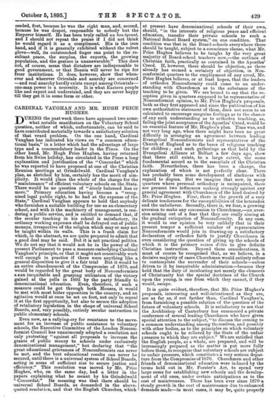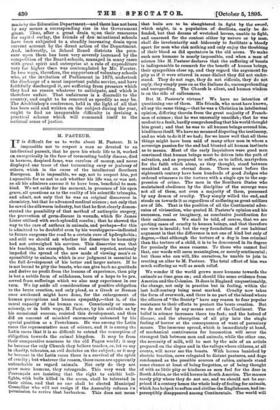CARDINAL VAUGHAN AND MR. HUGH PRICE HUGHES.
DURING the past week there have appeared two some- what notable manifestoes on the Voluntary School question, neither of which, unfortunately, can be said to have contributed materially towards a satisfactory solution of that vexed problem. On the one hand, Cardinal Vaughan has indicated his views on "a common educa- tional basis," in a letter which had the advantage of large type and a commendatory leader in the Times. On the other hand, Mr. Hugh Price Hughes, having returned from his Swiss holiday, has circulated in the Press a long explanation and justification of the " Concordat " which he was reported to have proposed at one of the Christian Reunion meetings at Grindelwald. Cardinal Vaughan's plan, as sketched by him, certainly has the merit of sim- plicity. It would place the whole of the charge for the "maintenance" of efficient voluntary schools on the State. There would be no question of "nicely balanced less or more." Primary education having become a "recog- nised legal public right, to be had at the expense of the State," Cardinal Vaughan appears to hold that anybody who furnishes a suitable building for use as an elementary school, and with it the machinery of management, is ren- dering a public service, and is entitled to demand that, if the secular teaching in his school is satisfactory, its ordinary working expenses shall be defrayed out of public moneys, irrespective of the religion which may or may not be taught within its walls. This is a frank claim for which, in the abstract, we are quite prepared to admit that a good deal may be said. But it is not practical politics. We do not say that it would not be in the power of the present Parliament to pass a measure embodying Cardinal Vaughan's principle, or that it might not conceivably work well enough in practice if there were anything like a general disposition to give it a fair trial But it would be an entire abandonment of the Compromise of 1870, and would be regarded by the great body of Nonconformists a san inequitable and grasping utilisation of the victory gained at the polls in 1895 by the party friendly to denominational education. Even, therefore, if such a measure could be got through both Houses, it would be met with most bitter opposition in the country, and an agitation would at once be set on foot, not only to repeal it at the first opportunity, but also to secure the adoption of retaliatory legislation in the shape of universal School Boards, and, very possibly, entirely secular instruction in public elementary schools.
Even now, as a rallying-cry for resistance to the move- ment for an increase of public assistance to voluntary schools, the Executive Committee of the London Noncon- formist Council has unanimously adopted a resolution not only protesting "against all proposals to increase the grants of public money to schools under exclusively denominational management," but declaring that "the great educational grievances of Nonconformists can never be met, and the best educational results can never be secured, until there is a universal system of School Boards, acting in areas of sufficient size to secure justice and efficiency." This resolution was moved by Mr. Price Hughes, who, on the same day, had a letter in the papers explaining what he meant by his Grindelwald "Concordat." Its meaning was that there should be universal School Boards, as demanded in the above- quoted resolution, and that the English Churches, which at present have denominational schools of their own, should, "in the interests of religious peace and efficient education, transfer their private schools to such a National School Board system," on one condition. That condition was that in the Board-schools everywhere there should be taught, subject to a conscience clause, what Mr. Price Hughes believes to be taught by the very great majority of Board-school teachers now,----the outlines of Christian faith, practically as contained in the Apostles' Creed. If, however, there should be objection, as there already has seemed a certainty of objection, in Non- conformist quarters to the employment of any creed, Mr. Price Hughes believes, or at least hopes, that the leaders of orthodox Nonconformity could come to an under- standing with Churchmen as to the substance of the teaching to be given. We are bound to say that the re- ception given in quarters supposed to be representative of Nonconformist opinion, to Mr. Price Hughes's proposals, both as they first appeared and since the publication of his own authoritative statement of them, does not seem to us calculated to encourage sanguine feelings as to the chance of any such understanding as to orthodox teaching, as, failing the joint acceptance of the Apostles' Creed, would be an essential feature of Mr. Hughes's plan. Time was, and not very long ago, when there might have been no great difficulty in arranging an agreement between leading Evangelical Nonconformists and representatives of the Church of England as to the bases of religious teaching for children ; and such gatherings as that held by the Evangelical Alliance at Belfast a few days ago, show that there still exists, to a large extent, the same fundamental accord as to the essentials of the Christian faith. Nevertheless, there has been a change, the explanation of which is not perfectly clear. There has probably been some development of slackness with regard to dogma. But we imagine that now, in many quarters where personal orthodoxy is unimpaired, there are present two influences making strongly against any general agreement with Churchmen of the kind desired by Mr. Price Hughes. First, there is the growth of a very delicate tenderness for the susceptibilities of the heterodox and the unbeliever. Secondly, there is, we fear, a growing aversion to make any concession to Churchmen,—an aver- sion arising out of a fear that they are really aiming at the gradual extirpation of Nonconformity. In any case, it would in our opinion be very unlikely that in their present temper a sufficient number of representative Nonconformists would join in drawing-up a satisfactory declaration of orthodox faith to justify Churchmen in even considering the question of giving up the schools of which it is the primary raison dY:tre to give definite Christian instruction. Beyond these considerations, it must of course be recognised that, as we believe, in a decisive majority of cases Churchmen would entirely refuse to contemplate the surrender of their schools—unless driven to it by inequitable administration—because they hold that the duty of inculcating not merely the elements of Christianity but the special doctrines of the Church upon the young, is one from which they cannot, if they would, escape.
It is quite evident, therefore, that Mr. Price Hughes's proposals, interesting and well-intentioned as they are, are as far as, if not farther than, Cardinal Vaughan's, from furnishing a possible solution of the question of the future of voluntary schools. It is satisfactory to see that the Archbishop of Canterbury has summoned a private conference of several leading Churchmen who have given special attention to the subject, "to discuss the coming to a common understanding among themselves, and possibly with other bodies, as to the principles on which voluntary schools ought to be relieved by the State of the unfair pressure to which they are subject." We are satisfied that the English people, as a whole, are prepared, and will be increasingly prepared as the matter is put more fully before them, to recognise that voluntary schools are subject to unfair pressure, which constitutcs a very serious depar- ture from the Compromise of 1870. Churchmen and other friends of denominational education were induced by the terms held out in Mr. Forster's Act, to spend very large sums for establishing new schools and the develop- ment of old ones, under certain anticipations as to the cost of maintenance. There has been ever since 1870 a steady growth in the cost of maintenance due to enhanced demands made—in most cases, it may be, quite properly
made by the Education Department—and there has not been by any means a corresponding rise in the Government
g -
rant Thus, after a great drain upon their resources for capit il outlay, the friends of den minational schools have been subjected to a steadily increasing drain upon current account by the direct action of the Department. And, indirectly, in School Board districts the pres- sure upon them has been very severely increased by the competition of the Board-schools, managed in many cases with great spirit and enterprise at a rate of expenditure very far higher than was contemplated by Mr. Forster. In two ways, therefore, the supporters of voluntary schools who, at the invitation of Parliament in 1870, undertook the discharge of a most important public service, and have faithfully discharged it, are suffering from pressure which they had no reason whatever to anticipate, and which is therefore unfair. That unfairness is a discredit to the country, and ought to be removed as speedily as may be. The Archbishop's conference, held in the light of all that has been said and written on the subject during the year, ought to find no insuperable flifficulty in devising a practical scheme which will commend itself to the national sense of justice.







































 Previous page
Previous page